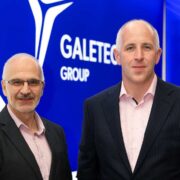In our new Pension Pot Podcast series, business owners are being urged to maximise pension contributions amid legislative changes. We talk to Bank of Ireland’s Olivia Ryan and George Nolan about what business owners need to do.
Business owners are being encouraged to take immediate action on retirement planning as new auto-enrolment rules and evolving pension products create both opportunities and potential pitfalls for wealth extraction strategies.
The message comes as significant changes to Ireland’s pension landscape over the past three years have expanded options for business owners seeking to convert company profits into personal retirement savings in a tax-efficient manner.
“Don’t look back and say, I had those profits at a point in time. Use the wealth extraction opportunities while it’s there”
“Please God, retirement will be the biggest holiday in our lifetime, and we all need plenty of spending money to make sure that that holiday is enjoyable for us,” says Olivia Ryan, senior financial consultant with Bank of Ireland. “A lot of business owners that I meet on a day to day basis, they keep their salary deliberately low due to revenue and taxation.”
Ryan explains that rather than taking higher salaries and losing approximately half to tax, companies should extract profits through pension contributions. “What the company should look at doing is extracting the profits in the business in the form of a pension in a tax efficient manner,” she says.
The approach involves comprehensive financial planning. “When I meet a customer, I meet for an hour to an hour and a half, and we do a full financial review in terms of how the business is working, and we put a plan in place,” Ryan explains. “Ultimately, any customer I meet, their end goal is to turn their business wealth into the personal wealth in the most tax efficient manner that they can do that.”
Providing for retirement
George Nolan, head of the Pensions Technical Team at Bank of Ireland Life, notes that “change is a constant when it comes to pensions and the pension landscape in Ireland.” However, he emphasises that “there is another constant there, which is the importance of providing for retirement.”
Traditional executive pension schemes, which allowed funding up to two-thirds of final salary, have evolved under master trust arrangements. Meanwhile, Personal Retirement Savings Accounts (PRSAs) have gained prominence following recent legislative changes.
“The restriction now is that you can put in 100% of your total income from your employer annually, that includes any bonuses, et cetera, that you might take so total emoluments, and get full relief on that,” Nolan explains. This development has made PRSAs “a real viable alternative to the traditional scheme.”
The flexibility extends to implementation strategies. “It doesn’t matter that you don’t understand the two products inside and out,” Nolan says. “If you end up with two different products, that’s no problem either. It can change over time and you can move between products.”
Tax advantages and wealth benefits
The financial advantages of pension contributions extend beyond immediate tax relief. “You’re taking money from the profits of the business that are subject to corporate tax, so you don’t pay corporate tax on those if you stay within the limits,” Nolan explains. “There’s no benefit in kind implications on the business owner.”
Additionally, pension funds grow tax-free, unlike traditional investment products subject to exit tax. Upon retirement, individuals can access tax-free lump sums up to €200,000, with married couples over 66 able to earn up to €36,000 from their pension without paying tax under income exemption limits.
Addressing the gender pension gap
Female business owners face particular challenges in pension planning, according to Ryan. “Unfortunately, in the majority of cases, that could be correct,” she says regarding whether women are less pension-ready than men.
The gap stems from two main factors: career interruptions or part-time work leading to reduced pension contributions, and a tendency toward conservative investment approaches. “Females tend to be a little bit more conservative and risk averse,” Ryan observes. “So as business owners, they may be a little bit more reluctant to take salaries out of their business, or to extract the profits that they’ve made within the business.”
Since women statistically live longer than men, Ryan stresses the importance of adequate pension funding: “It is really important that they have funded a pension that’s going to give them the lifestyle that they deserve.”
Auto-enrolment urgency
The impending launch of auto-enrolment on January 1, 2026, adds urgency to business owners’ pension decisions.
“It’s really important that business owners understand that if they don’t have a pension themselves, then they will be in the auto enrolment scheme as well, and the tax benefits are different,” Nolan warns. “In my view, it’s not the best fit for a business owner.”
This creates a narrow window for business owners to establish their own pension arrangements before being automatically enrolled in the less advantageous scheme.
Acting while profits exist
Both advisers emphasise the importance of taking action while businesses are profitable. “Just making those contributions while the business has turned profits, because we just don’t know what’s going to happen in the future,” Nolan advises. “Don’t look back and say, I had those profits at a point in time. Use the wealth extraction opportunities while it’s there.”
Ryan advocates for annual reviews to ensure plans remain on track: “This is your plan for the future. So really important, you’re making sure that the funding is going as we have planned. You’re looking at your investment choice. It might be a thing that you might need to de-risk the closer you get to retirement.”
The message for business owners is clear: with legislative changes creating new opportunities and constraints, the time for pension planning is now, while profits are available and before auto-enrolment rules take effect.
-
Bank of Ireland is welcoming new customers every day – funding investments, working capital and expansions across multiple sectors. To learn more, click here
-
For support in challenging times, click here
-
Listen to the ThinkBusiness Podcast for business insights and inspiration. All episodes are here. You can also listen to the Podcast on:
-
Spotify
-
SoundCloud
-
Apple





